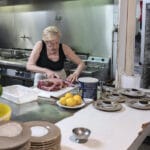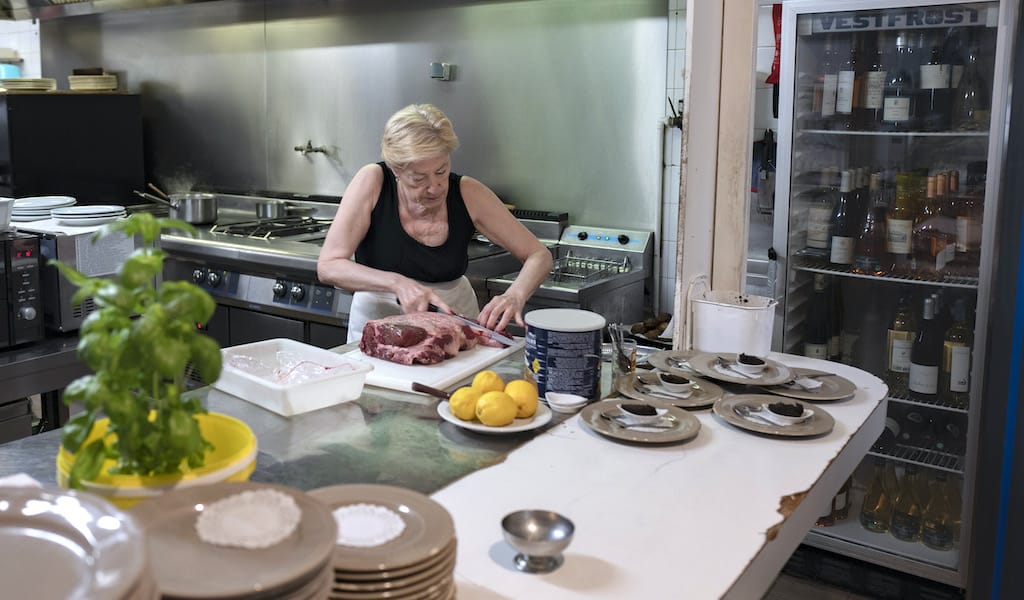In the mid-1980s, a teenage Félicité Gaye left the Côte d’Ivoire to join her older brother in Marseille. Though their homeland had been independent since 1960, the siblings had grown up in the era of Félix Houphouët-Boigny, the pro-France president who kept close ties to its colonial ruler. “France is beautiful and there is money to be made here,” Félicité’s brother urged.
Félicité’s plan was to get a good French education, and then put it to use back home. When visa problems prevented her from finishing university, the 21-year-old decided to stay, knowing her opportunities in the Côte d’Ivoire would be limited without a degree. She found work with a well-to-do Marseille family, cooking and tutoring their daughter. She didn’t realize her time in the kitchen would lead to owning a restaurant. And that she’d become an adopted mom to fellow Africans in Marseille.
Open for 23 years, her restaurant Mama Africa has seen untold African immigrants walk through the door, eager to savor the cuisine of their homelands. Though the sign says, “Ivoire Restaurant,” the cooking comes from across western Africa, reflecting the Côte d’Ivoire’s role as a regional hub. From alloko, fried plantains, to mafé, chicken in rich, peanut-butter sauce, the dishes are served in generous portions and, perhaps more importantly, with Félicité’s warm welcome.

It all started with a “For Sale” sign. In 1997, Félicité noticed it in a shuttered storefront across from her hairdresser in Noailles. Having honed her entertaining skills during the many soirées her boss hosted, the tenacious ivoirienne thought, “What if I opened my own place?” She loved to cook and socialize. And there were few African restaurants in Marseille at that time.
Many of the people in her life were less than encouraging. Some turned up their noses at the Noailles neighborhood, at the time a rundown area with a large immigrant population, while others warned that “no one knows Côte d’Ivoire food,” since immigrants from francophone Senegal and the Comoros are more prevalent in the city.
In a very Marseille twist, it was two Armenians that helped make Mama Africa happen. The first, the building’s landlord, sold the space for a steal, recognizing that immigrant-run, working class establishments were taking over the once-bourgeois neighborhood. The second, a nearby restaurant owner, lent Félicité rice for her opening after she had spent all her money on remodeling and other ingredients.
On that first night in 1998, she made enough for six people. Through word of mouth, Africans began to trickle in from across the city, charmed by Félicité’s traditional cooking and wide smile. A group of immigrants from anglophone Africa were so tickled to have found a place that felt like home, they began calling her “mama Africa.” The nickname stuck – and replaced “Ivoire Restaurant,” the original name for the restaurant.

In 2004, Mama Africa first appeared in print, a local newspaper’s article “Around the World in 80 Restaurants.” During Marseille’s 2013 reign as the European Capital of Culture, it was the only African restaurant selected for the festivities. Guidebooks followed, each write-up citing Félicité’s savoir-faire and familial welcome. Consequently, her clientele grew more diverse. “I drew Europeans back to Noailles,” she says proudly.
Mama Africa’s menu spans western Africa. From the Cote d’Ivoire, poisson à la braise (grilled whole fish) is a giant freshwater tilapia smothered in chopped onions and tomatoes. With its deliciously crisp skin and tender flesh, the fish is one of the most popular dishes, spotted on half the tables during a recent visit. We ate it for the first time alongside a friend, an Ivoirian refugé who had just arrived in Marseille – he teared up tasting the familiar flavors.
Also popular is attiéké, a couscous-like dish made with fermented cassava root instead of semolina. Félicité shares how at outdoor markets in the Ivory Coast, a line of women scoop attiéké from giant baskets so customers can taste. “The free samples would be lunch for me and my school friends,” she says with a smile.
“I want to show other African women they don’t need to rely on men,” explains Félicité.
From Senegal, pastels, fried dough pockets stuffed with various fillings, and, one of our favorites, yassa: chicken or fish bathed in a lemon-y sauce with melt-in-your-mouth caramelized onions. You can order other West African classics in advance, like saka saka (sautéed cassava leaves) and sauce graine (palm nut stew). To drink, be sure to try the bissap, a bright-fuchsia hibiscus juice that is made in-house. The potent homemade ginger juice is wonderfully refreshing, whether straight or mixed with rum for a tasty cocktail.
As a female-owned business, Mama Africa is an inspiration. “I want to show other African women they don’t need to rely on men,” explains Félicité. Never married, she has always managed her place on her own. Her daughter helped out before moving away from Marseille. Now, she hires fellow African women to wait tables and cook, giving them invaluable job skills. Since many have never worked in the restaurant industry, the service can sometimes be slow.

The customers don’t seem to mind. Many are regulars who enjoy the laid-back atmosphere and Félicité’s endearing nicknames. A new-to-town DJ is the “handsomest African in Marseille.” A compatriot in a wax print dress that matches the restaurant’s walls is “Miss Côte d’Ivoire.” African footballers from our local team, l’OM, and beyond rub elbows with tourists toting guidebooks from Europe, North America and Asia, curious about the cuisine of one of Marseille’s immigrant communities.
Counter to France’s regulated lunch and dinner hours, Mama Africa is open non-stop. “In my country, if your mouth is open, you can eat,” Félicité says with a laugh. Consequently, her place is a pillar in the Noailles neighborhood. She buys her produce at the local markets and seems to know many of the area’s residents and business owners. When two buildings a few doors down collapsed in 2018, she opened her restroom to emergency workers and cooked for displaced locals. One of the eight known victims, Simona, a 30-year-old Italian by herself in Marseille, frequented Mama Africa to feel less lonely. When her parents came to mourn their daughter, they ate together in tears.
When the Covid pandemic hit, Félicité began looking for a second location. Her 28-seat restaurant would burst at the seams on busy nights and lacked an outdoor terrace. She found a place up the street along the tree-lined patios of Cours Julien. After shuttering her original locale for a remodel, she opened the new space in October 2020. Only takeout was allowed until mid-May, when France finally lifted the ban on in-person dining.
Félicité is so excited to be back in business she practically leaps across the counter to hug a pair of brothers who’ve returned. “I love this métier for its sociability,” she explains, “and giving fellow Africans a place of reference.” She tells us that most Ivorians who come to France to study later return home for their adult lives. We’re glad she made hers here.
 December 11, 2023 Paule et Kopa
December 11, 2023 Paule et Kopa
Though Paris is littered with brasseries boasting classic French cuisine, Marseille […] Posted in Marseille August 3, 2022 Regain: Novel Idea
August 3, 2022 Regain: Novel Idea
Regain is housed behind the marigold shutter doors of one of Marseille’s trois fenêtres […] Posted in Marseille May 11, 2022 Oumalala
May 11, 2022 Oumalala
A month ago, I moved into to my new place in Marseille’s La Plaine neighborhood. After […] Posted in Marseille
Published on June 23, 2021
Related stories
December 11, 2023
MarseilleThough Paris is littered with brasseries boasting classic French cuisine, Marseille lacks restaurants that solely specialize in our traditional fare – a mix of Provençal garlic, tomatoes and olive oil, and the freshly caught delights of the Mediterranean. When we lamented this at a dinner party the other night, a woman chimed in, “What about…
August 3, 2022
Marseille | By Jenine Abboushi
MarseilleRegain is housed behind the marigold shutter doors of one of Marseille’s trois fenêtres (meaning “three windows,” the city’s typical brownstone). From the street, one can spy the full tables of the shady urban garden far on the other side. It is hard to believe that this Rue Saint-Pierre restaurant opened just six months ago, given…
May 11, 2022
Marseille | By Jenine Abboushi
MarseilleA month ago, I moved into to my new place in Marseille’s La Plaine neighborhood. After the moving truck drove off, leaving me with stacks of boxes and furniture and no food yet in the refrigerator, I ventured out in my dusty jeans to find a place to eat some lunch in the neighborhood. On…




















































































